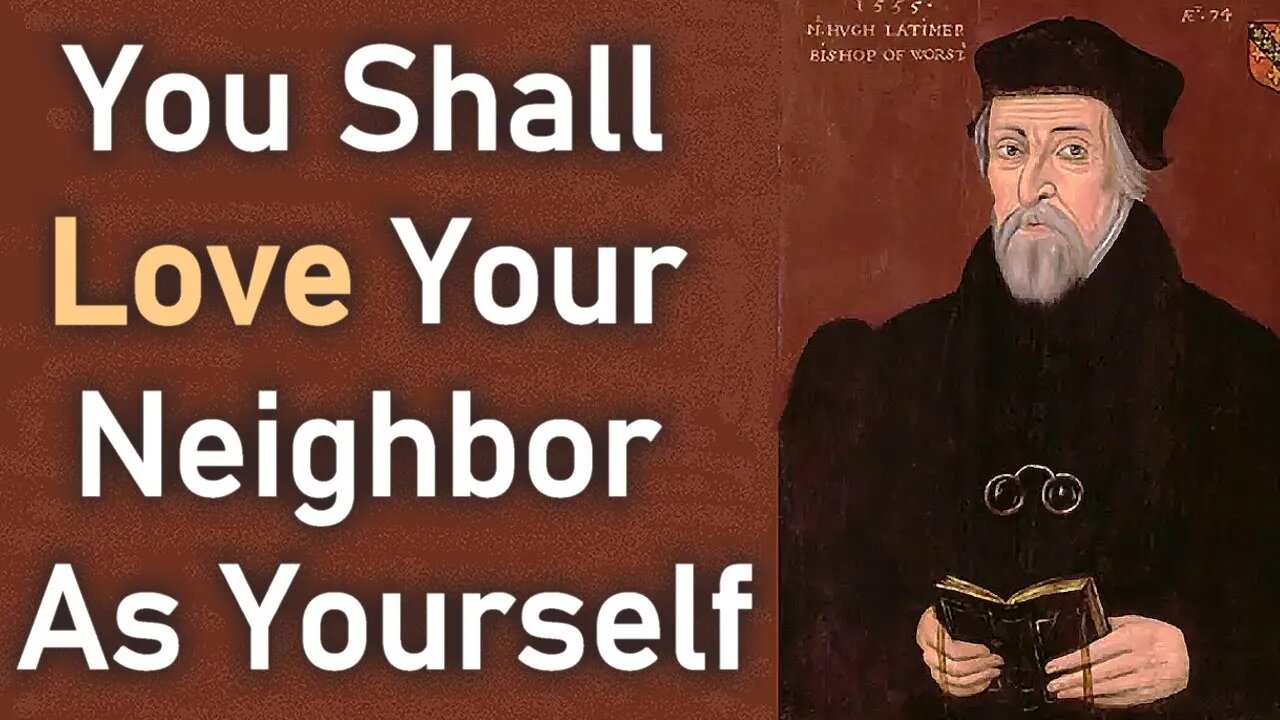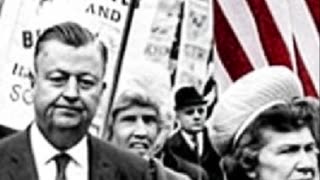Premium Only Content

You Shall Love Your Neighbor As Yourself - Hugh Latimer Sermon
▶️TWITTER: https://twitter.com/RichMoo50267219
8 Owe nothing to anyone except to love one another; for the one who loves his neighbor has fulfilled the Law. 9 For this, “You shall not commit adultery, You shall not murder, You shall not steal, You shall not covet,” and if there is any other commandment, it is summed up in this saying, “You shall love your neighbor as yourself.” Romans 13:8-9 / New American Standard Bible
You Shall Love Your Neighbor As Yourself - Hugh Latimer Sermon
Hugh Latimer (c. 1487 – 16 October 1555) was a Fellow of Clare College, Cambridge, and Bishop of Worcester during the Reformation, and later Church of England chaplain to King Edward VI. In 1555 under the Catholic Queen Mary I he was burned at the stake, becoming one of the three Oxford Martyrs of Anglicanism.
The pulpit from which Latimer preached in St Edward's Church, Cambridge
Latimer joined a group of reformers including Bilney and Robert Barnes that met regularly at the White Horse Tavern. He began to preach publicly on the need for the translation of the Bible into English. This was a dangerous move as the first translation of the New Testament by William Tyndale had recently been banned. In early 1528, Latimer was called before Cardinal Thomas Wolsey and he was given an admonition and a warning. The following year, Wolsey fell from Henry VIII's favour when he failed to expedite the annulment of Henry's marriage to Catherine of Aragon. In contrast, Latimer's reputation was in the ascendant as he took the lead among the reformers in Cambridge. During Advent in 1529, he preached his two "Sermons on the Card" at St Edward's Church.
In 1535, he was appointed Bishop of Worcester, in succession to an Italian absentee, and promoted reformed teachings and iconoclasm in his diocese. On 22 May 1538, at the insistence of Cromwell,[7] he preached the final sermon before Franciscan Friar John Forest was burnt at the stake, in a fire said to have been fueled partly by a Welsh image of Saint Derfel. In 1539, he opposed Henry VIII's Six Articles, with the result that he was forced to resign his bishopric and imprisoned in the Tower of London (where he was again in 1546).
"Latimer before the Council", from an 1887 edition of Foxe's Book of Martyrs, illustrated by Kronheim.
He then served as chaplain to Katherine Duchess of Suffolk. However, when Edward VI's sister Mary I came to the throne, he was tried for his beliefs and teachings in Oxford and imprisoned. In October 1555 he was burned at the stake outside Balliol College, Oxford.
Trial
On 14 April 1554, commissioners from the papal party (including Edmund Bonner and Stephen Gardiner) began an examination of Latimer, Ridley, and Cranmer. Latimer, hardly able to sustain a debate at his age, responded to the council in writing. He argued that the doctrines of the real presence of Christ in the mass, transubstantiation, and the propitiatory merit of the mass were unbiblical. The commissioners tried to demonstrate that Latimer did not share the same faith as eminent Fathers, to which Latimer replied, "I am of their faith when they say well... I have said, when they say well, and bring Scripture for them, I am of their faith; and further Augustine requireth not to be believed."
Latimer believed that the welfare of souls demanded he stand for the Protestant understanding of the gospel. The commissioners also understood that the debate involved the very message of salvation itself, by which souls would be saved or damned:
After the sentence had been pronounced, Latimer added, 'I thank God most heartily that He hath prolonged my life to this end, that I may in this case glorify God by that kind of death'; to which the prolocutor replied, 'If you go to heaven in this faith, then I will never come hither, as I am thus persuaded.'
Latimer was burned at the stake along with Nicholas Ridley. He is quoted as having said to Ridley:
"Play the man, Master Ridley; we shall this day light such a candle, by God's grace, in England, as I trust shall never be put out."
The deaths of Latimer, Ridley and later Cranmer – now known as the Oxford Martyrs – are commemorated in Oxford by the Victorian-era Martyrs' Memorial near the actual execution site, which is marked by a cross in Broad Street, formerly the ditch outside the city's North Gate.
Hugh Latimer said, "It may come in my days, old as I am, or in my children's days, the saints shall be taken up to meet Christ in the air, and so shall come down with Him again" (1 Thessalonians 4).
-
 2:59
2:59
Christian Sermons and Audio Books
1 month agoMy People Perish for Want of Knowledge - Dr. Carl McIntire #shorts #communism #communist #christians
361 -
 13:07
13:07
Robbi On The Record
3 days ago $4.89 earnedSweet Poison: The Big Fat Lie That’s Killing America
44.5K25 -
 LIVE
LIVE
Drew Hernandez
10 hours agoEPSTEIN VICTIMS SPEAK OUT & TRUMP DOUBLES DOWN
1,005 watching -
 1:36:41
1:36:41
FreshandFit
6 hours agoWe Are QUITTING YouTube...
51.9K32 -
 2:34:22
2:34:22
TheSaltyCracker
6 hours agoDrug Smugglers Blown Up 9-03-25
93.3K184 -
 3:12:59
3:12:59
VapinGamers
5 hours ago $1.05 earnedGrim Trials - Game Review/Playthru - Rougelight Dungeon Crawler - !rumbot !music
26.7K -
 2:47:55
2:47:55
Mally_Mouse
12 hours ago🎮 Let's Play!! -- Jak 2 pt. 16
50.9K2 -
 52:23
52:23
MattMorseTV
7 hours ago $16.87 earned🔴The Cartels are SCREWED.🔴
114K129 -
 1:32:46
1:32:46
Badlands Media
20 hours agoAltered State S3 Ep. 44: Epstein Files, Corrupt Judges, and the College Grift
54K2 -
 21:09
21:09
Bearing
17 hours agoAustralian “Racist” Protest EXPLODES 💥 Glowies, Brawls & Media Spin 📣
28.9K35